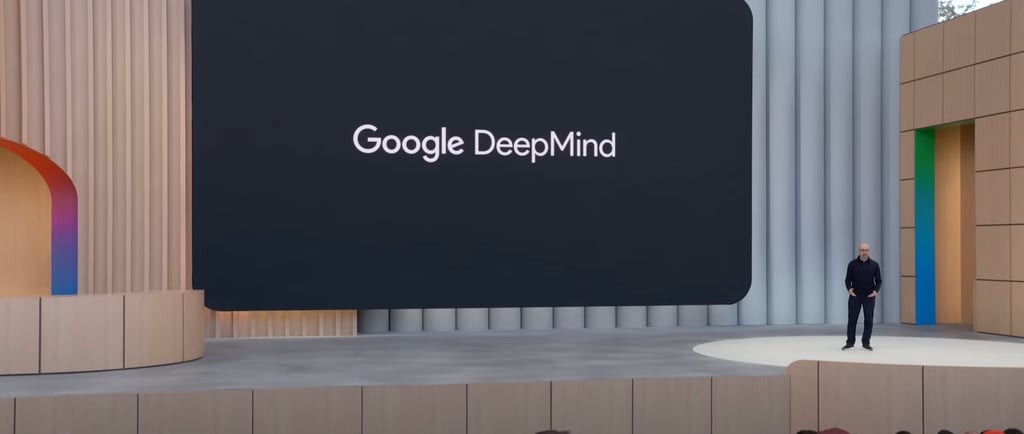Gemini 2.5 Pro: A Deep Dive into Google's Next-Generation AI
Gemini 2.5 Pro is Google's advanced AI model with enhanced reasoning, auditability, and native audio. It excels in coding, reasoning, and multimodal understanding, often outperforming competitors. It features a large context window, diverse input support, and tools like Google Search grounding and code execution. Its educational applications through LearnLM and future autonomous capabilities through Project Mariner are highlighted, with a strong emphasis on responsible AI principles.
TECHNOLOGY
Claudia
6/4/20256 min read


Google's Gemini 2.5 Pro has emerged as the company's most advanced and capable artificial intelligence model to date, representing a significant step forward in the Gemini family. This report provides a comprehensive analysis of Gemini 2.5 Pro, detailing its launch, core architectural philosophies, key capabilities, and technical specifications. It examines advanced features such as "Deep Think" mode for enhanced reasoning, "Thought Summaries" for enterprise auditability, native audio output for expressive interactions, and configurable thinking budgets. The model demonstrates state-of-the-art performance across a range of benchmarks, particularly in coding, complex reasoning, and multimodal understanding, often outperforming or being highly competitive with other leading AI models.
Developer-centric enhancements and enterprise endorsements underscore its practical applicability in diverse domains, including a notable case study in the legal sector with Harvey. Furthermore, the integration of LearnLM positions Gemini 2.5 Pro as a leading model for educational applications, while Project Mariner hints at future autonomous AI agent capabilities. Throughout its development and deployment, Google emphasizes a commitment to responsible AI principles and robust safety measures. This report synthesizes these aspects to provide a holistic view of Gemini 2.5 Pro's current standing and its potential implications for the future of AI.
The Evolution of the Gemini Family
The Gemini family of multimodal large language models (LLMs) was developed by Google DeepMind as the successor to its earlier LaMDA and PaLM 2 models. Initially announced in December 2023, the Gemini series, comprising Ultra, Pro, Flash, and Nano variants, was positioned to compete with other frontier models in the rapidly evolving AI landscape. The introduction of Gemini marked a significant stride in Google's AI endeavors, aiming to deliver models with enhanced reasoning, multimodal understanding, and coding capabilities.
The evolution from Gemini 1.0, which saw Gemini Pro integrated into Bard (now also named Gemini), to subsequent iterations like Gemini 1.5 with its extended context window, and Gemini 2.0, has been characterized by progressive enhancements in performance and efficiency. 1 The launch of Gemini 2.5 Pro signifies a new milestone, introducing what Google describes as its "most intelligent AI model" and a "thinking model" designed to tackle increasingly complex problems. 2 This report offers a comprehensive examination of the Gemini 2.5 Pro launch, delving into its core architecture, technical specifications, advanced features, benchmark performance, real-world applications, and the broader strategic vision encompassing its development, including responsible AI practice.
source image from Google DeepMind + Gemini for Developers | I/O 2025 Keynote
Gemini 2.5 Pro: Unveiling the "Thinking Model"
The rollout of Gemini 2.5 Pro has been phased, reflecting a strategy of iterative improvement and early access for developers and testers. Google first signaled the advent of its next-generation capabilities in March 2025 with the announcement of Gemini 2.5, highlighting it as a "thinking model". The initial experimental version, Gemini 2.5 Pro Experimental (model ID gemini-2.5-pro-exp-03-25), was released on March 25 or 28, 2025, showcasing strong reasoning and coding capabilities. This was followed by an updated version, Gemini 2.5 Pro Preview (I/O edition, model ID gemini-2.5-pro-preview-05-06), which was made available to developers on May 6, 2025, ahead of Google I/O, featuring even stronger coding capabilities. Broader general availability for the Gemini 2.5 family is anticipated with Gemini 2.5 Flash slated for release in Vertex AI in early June 2025, and Gemini 2.5 Pro to follow "soon after". Developers and enterprises can access Gemini 2.5 Pro through various platforms, including Google AI Studio, Vertex AI, the Gemini API, and the Gemini consumer application.
A central theme in the introduction of Gemini 2.5 Pro is the concept of a "thinking model". This philosophy entails the model's capability to "reason through their thoughts before responding," a process designed to result in enhanced performance and improved accuracy. This approach suggests a more deliberative process within the model, potentially involving internal iterative refinement or hypothesis testing before an output is generated. The Gemini 2.5 Pro Preview model card indicates that it builds upon the sparse Mixture-of-Experts (MoE) Transformer architecture, which was also utilized in Gemini 2.0 and 1.5. Refinements in architectural design and optimization methods are credited for substantial improvements in training stability and computational efficiency.
Foundational to Gemini 2.5 Pro's design are its native multimodality and a long context window. Native multimodality implies that the model is designed from the ground up to process and understand information from different types of data concurrently, rather than treating modalities as separate, bolted-on capabilities. This integrated approach is crucial for tackling complex tasks that involve diverse information sources.
Gemini 2.5 Pro is engineered with a robust set of capabilities and defined by specific technical parameters that enable its advanced performance. Gemini 2.5 Pro supports a wide array of input types, including text, code, images, audio, and video, while its output is currently text-based. The model can handle a significant volume of multimodal data per prompt:
Images: Up to 3,000 images, with a maximum size of 7 MB per image. Supported MIME types include image/png, image/jpeg, and image/webp.
Documents: Up to 3,000 files, with up to 1,000 pages per file and a maximum size of 50 MB per file. Supported types are application/pdf and text/plain.
Video: Up to 10 videos per prompt. Maximum length is approximately 45 minutes with audio and 1 hour without audio. A wide range of video MIME types are supported, including video/mp4, video/mpeg, and video/quicktime.
Audio: One audio file per prompt, with a maximum length of approximately 8.4 hours (or up to 1 million tokens). It supports audio summarization, transcription, and translation, with various supported MIME types like audio/mp3, audio/wav, and audio/flac.
Deep Think Mode
"Deep Think" mode is an enhanced reasoning mode for Gemini 2.5 Pro, leveraging new research techniques that enable the model to consider multiple hypotheses before responding. This feature is specifically designed for highly complex use cases, particularly in areas like advanced mathematics and coding, where exploring different solution paths can lead to more accurate and robust answers. Google has reported impressive scores for Gemini 2.5 Pro with Deep Think on challenging benchmarks such as the 2025 USAMO (United States of America Mathematical Olympiad), LiveCodeBench (a competition-level coding benchmark), and MMMU (a multimodal reasoning test). Deep Think mode is slated to be available to trusted testers on Vertex AI, with broader availability pending further safety evaluations due to its frontier capabilities.
For enterprise-grade AI applications, Gemini 2.5 Pro (and Flash) will offer "Thought Summaries". This feature provides clarity and auditability by organizing the model's raw "thoughts"—including key details of its reasoning process and any tools it utilized—into a clear, understandable format. The availability of such summaries allows customers to validate the model's approach to complex tasks, ensure its outputs align with business logic, and dramatically simplify debugging processes. Ultimately, this contributes to building more trustworthy and dependable AI systems, a critical factor for enterprise adoption where understanding the "how" behind an AI's decision is often as important as the "what."
Conclusion: Gemini 2.5 Pro – Charting New AI Horizons
Gemini 2.5 Pro represents a substantial advancement in Google's AI portfolio, showcasing superior reasoning (particularly with the promise of Deep Think), state-of-the-art coding capabilities, robust native multimodality, a vast context window, and a suite of enterprise-ready features including Thought Summaries and enhanced security.
These developments position Gemini 2.5 Pro to significantly impact various domains. For developers, it offers new tools and simplifies the creation of complex AI-driven applications. For enterprises, it promises more efficient workflows, deeper data insights, and the potential for novel AI-powered solutions, as evidenced by early adoption in sectors like legal tech and data analytics. The integration of LearnLM also highlights its potential to revolutionize educational tools and methodologies.
The launch of Gemini 2.5 Pro, with its impressive benchmark performance and advanced features, undoubtedly intensifies the competitive dynamics in the AI landscape, spurring further innovation across the industry. However, Google's concurrent emphasis on enterprise-readiness—focusing on security, auditability, and control—alongside comprehensive developer tools, suggests a strategy aimed not merely at achieving benchmark supremacy but at fostering widespread, practical adoption. This dual approach seeks to translate raw AI power into tangible value and market integration.
Furthermore, the introduction of "thinking models," the multi-hypothesis approach of Deep Think, and the agentic capabilities foreshadowed by Project Mariner collectively point towards a trajectory of building AI systems that can reason, plan, and act with increasing autonomy and sophistication. While not Artificial General Intelligence (AGI), these advancements are significant stepping stones on the long road toward more generally capable intelligent systems. Each such release pushes the boundaries of AI, bringing the field closer to that long-term goal. As the Gemini family continues to evolve, Google's AI ambitions appear focused on charting new technological frontiers while navigating the critical need for responsible stewardship of these powerful emerging technologies.
Sources used in the article
en.wikipedia.org
Gemini (language model) - Wikipedia cloud.google.com
What Google Cloud announced in AI this month – and how it helps you
blog.google
Gemini 2.5 Pro update: Coding, web apps with Gemini - Google Blog
Opens in a new window
codelabs.developers.google.com
Introduction to Gemini 2.5 Pro on Google Cloud - Google Codelabs
deepmind.google
Expanding Gemini 2.5 Flash and Pro capabilities | Google Cloud Blog
blog.getbind.co
Gemini Pro vs GPT-4: An in-depth comparison of LLM models – Bind AI
ai.google.dev
Gemini models | Gemini API | Google AI for Developers
Gemini 2.5 Pro - Google DeepMind
Opens in a new window
Report Makes Business Case for Responsible AI - Campus Technology
leanware.co
Gemini 2.5 Cost and Quality Comparison | Pricing & Performance
storage.googleapis.com
Opens in a new window
one.google.com
Google AI Plans and Features
Opens in a new window
ai.google.dev
Harvey: Validating Gemini 2.5 Pro Preview's Advanced Legal ...
arxiv.org
bgr.com


